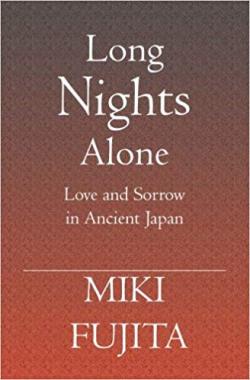Long Nights Alone

BookSurge Publishing, 2006, 268 pages, ISBN: 1419614274
Review by J. Sean Curtin
Long Nights Alone is an impressive debut English language novel by the established Japanese author Miki Fujita. The book seamlessly transports the reader to the intriguing but socially ridged world of 10th Century Japan. Fujita brilliantly blends a fascinating historical setting with a gripping narrative which makes for compelling reading. The way people lived in 10th Century Japan is probably a complete mystery to most non-specialist readers and this makes the rich tapestry of historical facts laced throughout the book one of the reasons it is so enjoyable to read. Fujita succeeds in skilfully illuminating a complex lost world in this excellently researched novel. Her lucid, engaging writing style makes the transition to this distant alien land seem almost natural, and she allows the reader to understand a little of the dynamics of the period. I certainly felt I gain some insights into the social structure of the period, and how it shaped the logic as well as behaviour of the people of that age.
The novel largely revolves around the life, love and frustrations of the talented Lady Bellflower, whose life course is dictated by the complex social norms of the period. The actions of the young, innocent Bellflower are severely restricted by the traditions of her age and in many respects she is the archetypal bird in a gilded cage. Her thoughts burn with passion and curiosity about the world which she so eloquently depicts in poetry, while her heart yearns to know the true meaning of love. Yet this beautiful young woman finds herself trapped in a realm where the kind of love she so desperately craves is an illusion confined to the realms of fiction. Following the social conventions of the time her parents strongly encouraged her to marry a man from a prominent family to enhance their own and her social status. They recommend a union with the down-to-earth Fujiwara Tomonaga, who is an up-and-coming aristocrat. To a certain degree Tomonaga is the antithesis of Bellflower’s male ideal and she tries to resist his advances. An inner struggle between love and duty plays itself out within the young energetic woman, but Bellflower eventually submits to her family’s wishes, agreeing to tie the knot with Tomonaga.
Her new husband already has one established wife, the calculating Lady Wisteria, as well as a long-term mistress, the gracious Morning Glory. Soon after her wedding night Bellflower discovers the agony of being forced to share her new husband with another woman and the conflict this creates within her eventually consumes her. Over time the pain of her situation makes her selfish and bitter until her poetry is the only true vestige of her former self.
Bellflower channels her passion into her writing as a means of escape from the social sarcophagus within which she is entombed, but while her prose remains sophisticated it conceals a darker side. At the other end of the spectrum, the same cultural milieu transforms Tomonaga’s mistress, Morning Glory, into a beacon of self-sacrifice whose virtue outshines all the other characters. Lady Wisteria, Tomonaga’s scheming first wife, is the great survivor of the story and one feels she would be at home in any age. How each of these very different women copes with the confines of the age they find themselves in is one of the fascinating themes of the narrative. As for Tomonaga, despite his many faults he eventually learns the meaning of true love.
According to a foreword by the author, the underlying source for the novel is a 10th Century diary by an aristocratic woman known to history only as “Mother of Michitsuna” who was married to the powerful aristocrat Fujiwara Kaneiye. This diary was required reading for classical literature classes when Fujita was a high school student in Japan and while “Long Nights Alone” is an entirely original work, the poems from this classical work about the deep loneliness the lady felt when her husband was away provided the inspiration for the novel. It seems that allowing the non-Japanese reader greater insights into Japan is one of Fujita’s primary objectives and presumably one of the main reasons she decided to write the novel in English instead of her native Japanese. The result of her efforts is an impressive debut English language novel, which offers an enlightening window on a murky period of Japan’s history. With “Long Nights Alone” Fujita has established herself as a new talent to watch.

